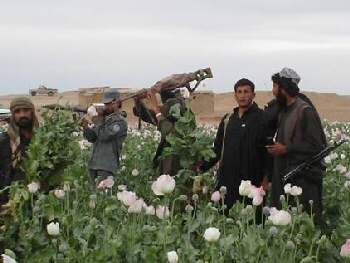Things are not going well in Afghanistan. In a stunning admission that the hundreds of millions of dollars spent trying to eradicate the country's opium crop had accomplished little, the United Nations Office on Drugs and Crime (UNODC) announced Saturday that this year's Afghan opium crop is up a "staggering" 60% over last year and will yield a record 6,100 tons this year, leading to a global surplus in black market heroin.
Opium is the backbone of the Afghan economy, accounting for somewhere between 35% and 50% of gross national product, and Afghan opium is the backbone of the global traffic in narcotics, now accounting for 92% of total illicit global production, according to UNODC.

"The news is very bad. On the opium front today in some of the provinces of Afghanistan, we face a state of emergency," UNODC head Antonio Maria Costa told a Kabul news conference after presenting results of its crop survey to Afghan President Hamid Karzai. "In the southern provinces, the situation is out of control."
In southern Helmand province, now a hotbed of Taliban activity, cultivation rose by a whopping 162% and accounts for 42% of total Afghan opium cultivation, the UNODC said. Costa told the Kabul news conference that NATO must step up its role in fighting the opium trade, especially in the south, where it is helping to fuel the Taliban insurgency.
"We need much stronger, forceful measures to improve security or otherwise I'm afraid we are going to face a dramatic situation of failed regions, districts and even perhaps even provinces in the near future," Costa said.
But while NATO commanders late this week called urgently for more troops on the ground in the south, they have little interest in fighting the drug war. NATO's official position is that its mandate is for stability and peace-keeping, not counternarcotics.
Still, there is pressure from the Americans and the British to try to wage both the war on terror and the war on drugs simultaneously. The top American anti-drug official in Afghanistan, Doug Wankel, told the press conference the need was urgent. "This country could be taken down by this whole drugs problem," he told reporters. "We have seen what can come from Afghanistan, if you go back to 9/11. Obviously the US does not want to see that again."
But analysts consulted by Drug War Chronicle warned that attempting to quash the opium economy and fight the Taliban at the same time is a recipe for disaster. "Paradoxically, the more they go after opium production, the more they strengthen the bond between the Taliban and the population and the traffickers," said Vanda Felbab-Brown, a research fellow at the Brookings Institution and Harvard University's John F. Kennedy School of Government Affairs. "It is a difficult conundrum. There can be no fundamental progress on either the narcotics problem or stabilization in general unless we deal with the insurgency," she told the Chronicle.
"The Taliban have now once again become integrated into production in the south," Felbab-Brown explained. "After 2001, they were pretty much forced out of the drug trade because they were fleeing and because the US and coalition forces were not going after drug trafficking. But now, the traffickers need someone to protect them, to scare off the eradication teams and the state presence, and the Taliban is providing this protection. It is also exploiting the eradication effort," the expert on illicit drugs and military conflict said. "They are handing out leaflets saying things like 'We are the Taliban. Isn't it awful that Karzai under the pressure of the foreign infidels is trying to destroy our crops. Here's our cell phone number. Give us a call.' So now, the Taliban is not only profiting financially, it is also gaining the allegiance of the population by providing protection."
"Things are a bit out of control because so many things happening in Iraq and the Middle East keep the superpowers' eyes off of Afghanistan, so the intruders have more opportunities to accelerate their destruction and illegal activities," said Raheem Yaseer, assistant director of the Center for Afghanistan Studies at the University of Nebraska-Omaha. "At the same time, the coalition and the Karzai government are too busy fighting the Taliban and Al Qaeda to concentrate on eradication," he told the Chronicle.
"The Taliban is moving into the areas where there is drug cultivation, and they receive support from farmers who have had their crops destroyed or threatened," Yaseer continued. "Thus, the traffickers and growers have a bit more freedom than usual. That's why business is booming for the drug dealers. There are too many fronts to deal with, and eradication is just one front."
Solutions are hard to come by. "Nobody knows what the answer is," Yaseer conceded. "Out of those billions of dollars they are spending, they need to use some to compensate farmers and create other jobs and projects. People in the provinces are unemployed and hungry, and the terrorists offer them money to join them. People turn to the Taliban and the terrorists and the drug dealers because that's where the money is. The government and the coalition cannot compete with the money drug dealers offer. It doesn't help that there is such nepotism and involvement of high level officials in the trade. That only makes it all the more difficult to enforce the drug laws. Many government officials are supporting the trade, not fighting it."

For Felbab-Brown, it comes down to doing counterinsurgency right. "It is critical to increase the number of forces, to increase the troop presence and the delivery of aid," she said. "It's difficult to deliver aid during an active insurgency, but it is vital. But we also need patience, especially on the narcotics issue. The big pressure for premature eradication coming from Washington and international organizations needs to be resisted. We need more money, more troops, more development. Is this international community willing to provide these resources?"
Being patient with the opium economy is getting closer to the correct approach, said Ted Galen Carpenter, a foreign affairs and drug policy analyst with the libertarian leaning Cato Institute. "The only solution is one that no one in any position of influence in Washington or the NATO capitals will consider -- drug legalization," he told Drug War Chronicle. "That would take the black market profits out of the drug trade. It is the ultimate solution. If they won't consider legalization, the very least they can do is look the other way with regard to the drug trade. That worked in Peru in the 1980s, when the Peruvian generals figured out that leaving the coca crop alone dried up support for the Shining Path. Something similar needs to occur in Afghanistan, whether they admit it or not. If they are serious about preventing a further rebound of the Taliban and Al Qaeda, they need to lay off the drug war."
Trying to wage both the war on terror and the war on drugs undermines US policy in the country, Carpenter argued. "There is a fundamental inconsistency in the US nation-building strategy in Afghanistan. The primary goal remains to undermine the Taliban and Al Qaeda, but the problem is if they go after the drug trade, they alienate a major portion of the population and strengthen support for the Taliban. Even trying to prosecute the war on drugs there undermines the primary US goal in Afghanistan."
One European defense and development group, the Senlis Council, has proposed for nearly a year now that the Afghan opium crop be licensed, legalized, and diverted to the legitimate medicinal market. Senlis was harshly critical of Western policy this week.
"Huge amounts of money have been spent on large and costly military operations, but after five years southern Afghanistan is once more a battlefield for the control of the country," said Senlis executive director Emmanuel Reinert as he announced the publication of a new report on the rebirth of the Taliban. "At the same time Afghans are starving. The US has lost control in Afghanistan and has in many ways undercut the new democracy in Afghanistan. I think we can call that a failure, and one with dire consequences which should concern us all. The US policies in Afghanistan have re-created the safe-haven for terrorism that the 2001 invasion aimed to destroy."
But the Senlis licensing proposal is getting little respect or traction and is unlikely to prevail, said Yaseer. "I don't think the Senlis Council proposal will get very far," said Yaseer. "There is all kinds of opposition to any legalization. The religious groups will not support it, the legislators will not support it. There are also serious questions about whether it would just open up more venues for growing and trafficking."
Questions, questions. There are lots of questions in Afghanistan, but few good answers.
This work by StoptheDrugWar.org is licensed under Creative Commons Attribution-ShareAlike 4.0 International
Comments
opium eradication
"There are also serious questions about whether it would just open up more venues for growing and trafficking."
This is the kind of thinking that prevents any solution being found.
It is also the mindset of those on this planet who mistakenly beleive that they are the rulers of all men,and the only way to live is their way,or at least the way they like to pretend they live.
In truth the worlds governments bar a few decent people only act when it is to their advantage,
tey do not care for joe public where ever he may live. Bush has spent unknown amounts of the american peoples money bombing parts of afganistan or rather poppy fields plus the odd handfull of farmers relatives etc and made no effort whatso ever to promote help with alternative ways to earn a living AND this was while iraq was being destroyed so to comment that iraq etc distracted anyone from doing anything is pure shite.
There are many problems on our planet and it is the instigators of human misery suffering that also seem to offer the solutions.We need to look away from murderers like bush/blair/.......
to help and we need to take the planet off of those who deny us to roam, those who really poison our hearts and minds /water supply/foodchain etc etc etc. And untill that day comes, as it has been for centurys nothing will change,and the true realization of the nature chaos will be evident to all. adios good luck
how is the united states
how is the united states dealing with this? and what are they doing about it?
Add new comment